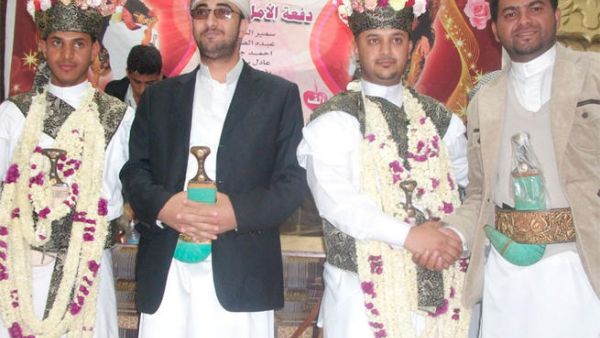Traditional weddings in Yemen are usually the scene of joyful faces, strings of lights and until recently, swollen cheeks full of qat.
Chewed by millions of men and women every day, the green leaf draws ire from many water experts, who say the cultivation of qat is consuming too much of the country's water resources. However, qat, a mild narcotic, is entrenched in social customs and is typically a staple at weddings, often provided by the bride and groom as a gift.
At large social occasions, the cost of supplying qat for the entire wedding party is often huge, impacting the couple and their family long after the day has ended.
In a snub to tradition, youth have increasingly banned qat from their weddings entirely. In November 2012, a young Yemeni, Al-Bara Shaiban, decided to deviate from the norm by holding one of the first qat-free weddings in Sana’a that generated media attention.
Requesting that his guests refrain from chewing qat, many entered the wedding with skepticism, however after a fun-filled day their attitudes soon changed.
Praised by several social and political figures, Bara’a’s wedding encouraged several others to follow suit. Marking a turning point, since then the number of qat-free weddings has noticeably increased in Sana’a and other governorates such as Hodeida and Taiz.
Mohammed Al-Shehabi, a young man from Taiz, says he was the first to hold a qat-free wedding in his area. Attracting the presence of several social and political figures and leading businessmen, the event challenged qat’s dominance at weddings in the governorate.
Shawqi Ahmed Hael, the governor of Taiz, attended Al-Shehabi’s wedding and announced that the government will allocate YR500 million of qat taxes to establish places for youth to practice sport and spend their leisure time there instead of chewing qat.
For his part, businessman Abdulwase Hael Saeed, the head of Yemen Without Qat Foundation, called on people to work together to rid Yemeni society of qat.
“We are among the most backward countries because we waste our time chewing,” he said. He went on to say that qat trees consume about 60 percent of the country’s water resources, negatively affecting the national economy and ability to sustain itself in the future.
Ali Al-Hawani, a wedding singer in Sana’a, said not to call the small trend a movement yet.
“Yemenis prefer to chew qat in gatherings and weddings as they are used to this tradition,” he said.
He added that many people, including people who chew qat recreationally, accept weddings without qat, but others will continue to provide it along with bottles of water because it’s considered an act of generosity. If the groom doesn’t provide qat for his guests, he could be considered stingy.
Hussein Mansour, a marriage contract manager in Sana’a said, “A free-qat wedding makes the occasion blessed. If we succeed in removing qat from our weddings, it will lay the pathway for it to be gradually banned from all social gatherings in the country. Only with this, will we be able to begin development projects that function without qat, backwardness, weapons and corruption.”
Mujeeb Al-Fatish, the Coordinator of Youth Initiatives in Sana’a, said, “It is possible that all our weddings will be qat-free, but only if the people and the government show support for this move.”
Some businessmen in Yemen have also showed their support for the trend, with some even saying they are willing to cover the expenses of weddings that are qat-free.
Many politicians and civil society organizations have been active in combating qat growing in Yemen, but the change in attitudes is still new. Recently, Parliament turned down a bill aimed at tackling the spread of qat and qat-growing.
The bill is designed to gradually prevent qat planting, over a period of 21 years. According to the bill, farmers who quit growing qat will be compensated, allowing them to diversify their crops slowly.
Dr. Najeeb Saeed Ghanim, a Parliament member and the Head of the Heath and Population Committee, introduced the bill.
“The bill provides a gradual plan so that qat will be prohibited in the future,” he said.
Ghanim indicated that the bill involves economic alternatives to solve income-related issues caused by changing crops.
Abdulrahman Al-Qubati, a member of Qat-Free Generation Organization, said the group launches seasonal campaigns to disseminate information about the detrimental effects of qat.
“The organization will also stage a protest in front of the House of Representatives in order to lobby Parliament to enact the bill so that Yemen’s future will be economically and socially free of qat and its negative impacts.”
Al-Qubati added the purpose of the organization is to make Yemen’s future generations understand the effects of qat on society.
Many other civil society organizations strive to educate people about the harmful effects of qat, but changing entrenched social attitudes and highlighting the dangers of qat consumption may take years not months, they say.
Saeed says Yemenis spend up to $20 million a day on qat consumption.
Studies also highlight that the average family expenditure on qat often reaches 12 percent of their total income, with only two percent being spent on education and three percent spent on health.
With increasingly dangerous chemicals and pesticides being used to increase qat production, society may face a looming health catastrophe if the growing of the leaf is not regulated or controlled, anti-qat campaigners say.
By Ashraf Al-Muraqab
Do you think Yemeni weddings are better off qat-free? Or is it an important part of tradition? Share your comments with us below!








